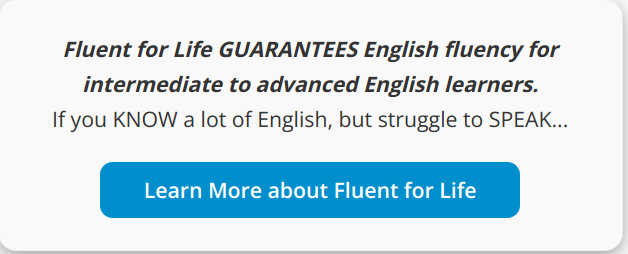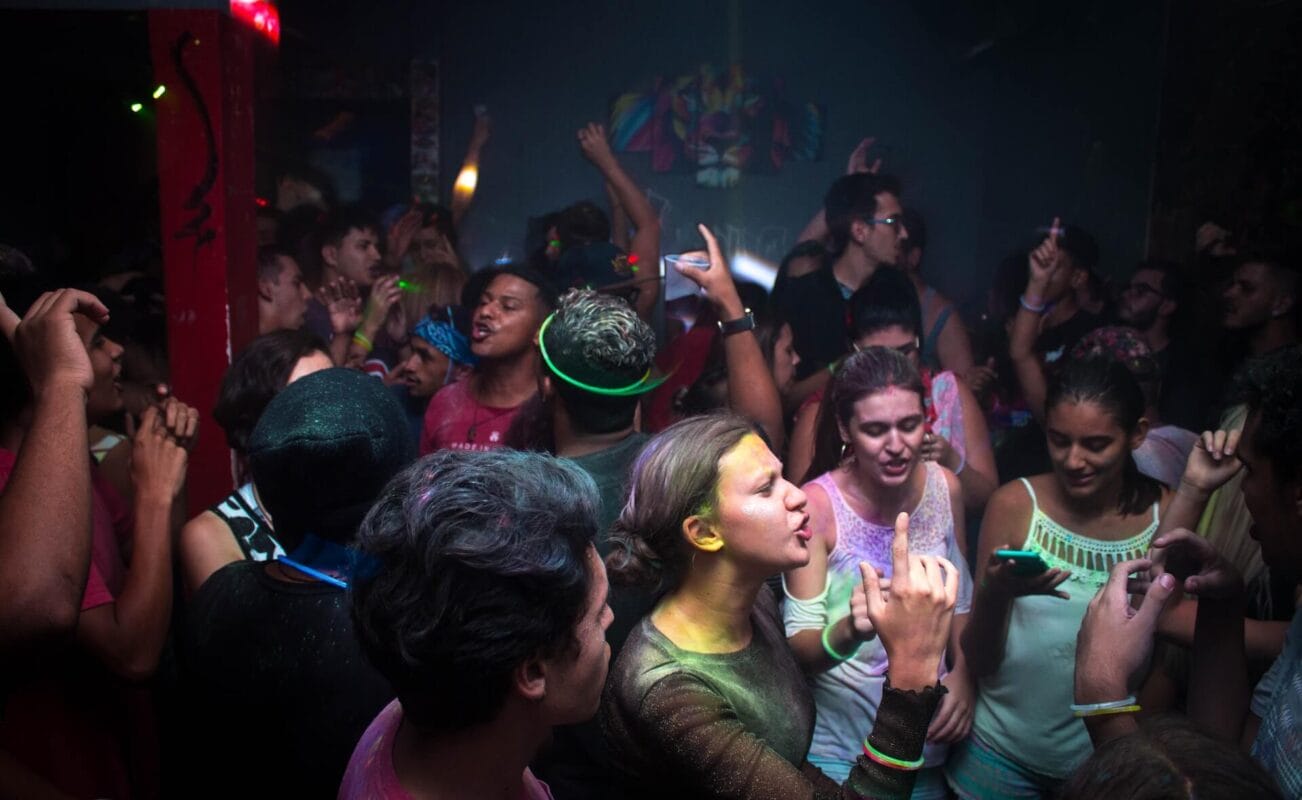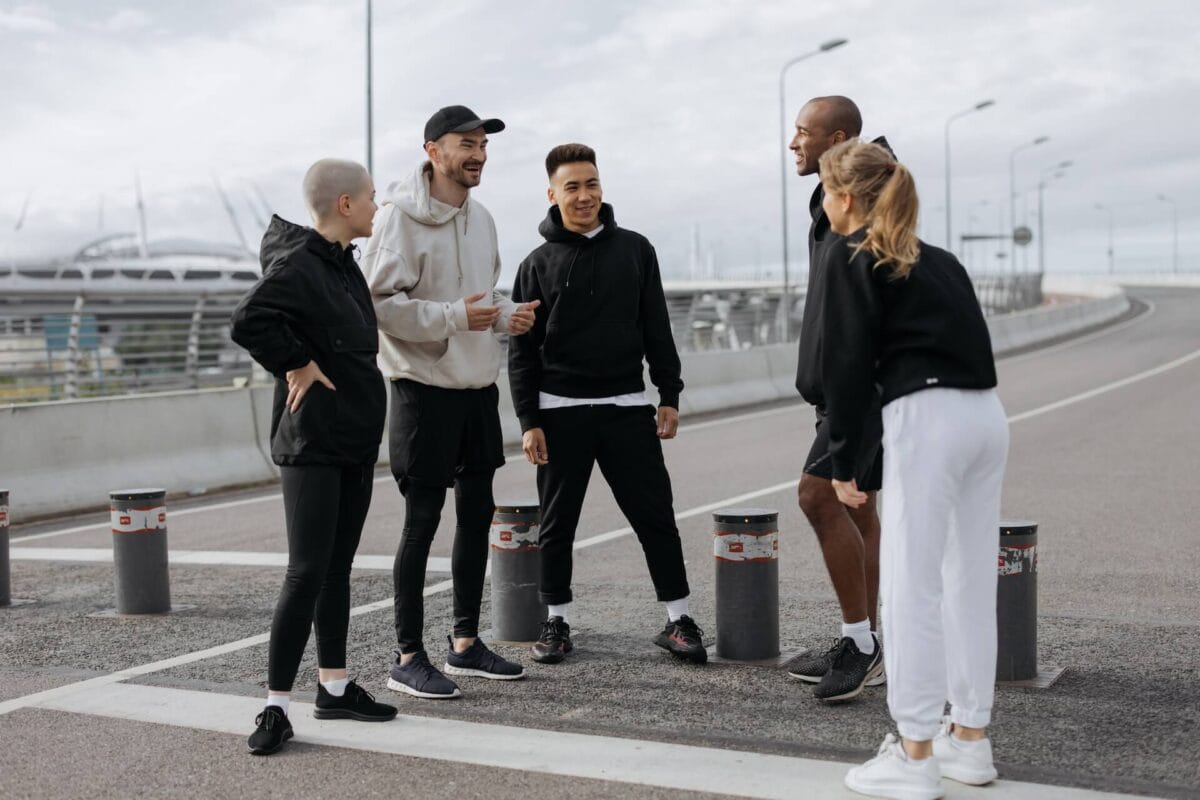English
Unlocking the Secret Language: 100 Most Common Slang Words for Everyday Situations
When you’re watching an exciting new movie with your friends, one of the actors says, “That party last night was lit!”
What does “lit” mean? Was there a fire? And why did he sound so excited?
This character was using a slang word to describe the party he attended. Lit means really good.
People in the same group communicate using slang words, and when you know them, you become part of the group, too!
It’s important to learn them so you can understand native speakers in movies, music, and conversations.
English has thousands of slang words, which can be confusing if you don’t understand them or how they’re used.
Learning slang, and learning to speak confidently with slang, is a hallmark of sounding fluent, even if you don’t personally use it.
In today’s lesson you will learn what English, and particularly American slang, words are, when to use them, and when not to use them.
To practice speaking English, I have also listed 100 examples of the most common slang words.
Slang Words: What Are They?
Almost anywhere, you can hear slang words or phrases used in certain social settings or by certain groups of people.
You may have heard someone tell you to “keep your cool” during an important meeting.
In addition to breaking a lot of English-speaking rules, slang also changes constantly, as words drop out of fashion and new words become slang every year.
Because slang words and phrases serve to create an in-group (like some teenagers) and an out-group (like their parents and teachers) who do not understand them, they don’t make sense at face value. However, with the right context, they can be a powerful tool for expressing yourself.
Slang words can help you become a more fluent and confident speaker.

Slang Words: When Are They Okay?
You must understand the context in which slang is appropriate. Slang may be appropriate in the following situations:
- Situations with friends or family that are informal.
- Text messages and social media posts are examples of online communication.
- Writing creatively.
Slang words are not appropriate in some situations, such as interactions with people you don’t know, business meetings, job interviews, or when you’re not certain of a word’s meaning.
Pay attention to what people say to determine whether they are appropriate.
The best way to learn them is to listen to several native speakers using them in different situations, which I call Naturally Varied Review.
American Slang Words You Should Know
I have compiled a list of 100 common slang words and their contexts to help you understand slang and the situations in which it may be appropriate to use it.
- Casual Conversations
- Everyday Life
- Socializing and Partying
- Expressions of Surprise/Disbelief
- Positive Reactions
- Negative Reactions
- Expressions of Agreement
- Expressions of Disagreement
- Expressions of Excitement
- Expressions of Frustration/Irritation
Casual Conversations

A casual conversation takes place with a friend or someone you know well in a variety of settings, such as at a restaurant, bar, or sporting event.
The following are some common slang words you’ll hear in casual conversation:
- Dude
Hey, dude! What’s up?
This slang word is usually used to refer to a man, but can also refer to a woman. It is often used as a greeting when two familiar people are glad to see each other.
- Bro
We had a blast, bro! You should have been there!”
In informal settings, bro refers to a male friend. It is a short form of brother.
You may hear someone say “Those frat guys are just a bunch of bros,” referring to young men who are particularly social and enjoy unintellectual pursuits.
Bro can have positive or negative connotations depending on the context.
- Chill
It’s amazing how chill she is.”
The speaker may be referring to her in this way because she is calm and collected in her demeanor. Chill does not refer to temperature here.
- Cool
“That’s great, thanks for letting me know.”
Alternatively, cool can be used sarcastically, such as when a person says “great” and rolls their eyes at a less-than-ideal situation.
- Awesome
It’s awesome that you got an A+ on your test!
The word awesome describes something that inspires awe, admiration, fear, or apprehension. In this example, the test might have been incredibly difficult, so receiving an A+ is impressive.
- Sweet
It’s so sweet, dude, that Tesla!
Sweet is slang for something that is great, awesome, or cool. A brand-new Tesla with all of its fancy features is very sweet.
- No worries
“You won’t make it to dinner on time? No worries!”
A slang expression that means “it’s not a problem” or “don’t worry about it.” “No worries” means not to worry, but in a short, casual manner.
- Hang out
Would you like to hang out with me?”
Imagine hanging out with someone like bananas in a tree if you want to spend some quality time with them.
- Catch up
Whenever you have time, let’s catch up!”
Generally, people catch up over coffee or a bite to eat when they catch up.
As a result of racing, you may be behind another runner, so you must run faster to catch up. In the same way, if you haven’t seen each other for a while, you are behind on one another’s life. You need to talk to catch up and get up to speed.
- What’s up?
Hey man, nice to see you. What’s up?”
What’s up is a slang way of asking someone “how are you?”
This doesn’t mean you’re asking what is above the person you’re speaking to, but rather what is happening in their life or how they’re feeling right now.
Everyday Life

Situations in everyday life happen everywhere, whether at work, on the way to school, at the grocery store, or anywhere else!
Some of the most commonly used everyday slang words are:
- ASAP
“I need this document on my desk as ASAP!”
The pronunciation is either ay-sap or ay es ay pee.
An ASAP is used when there is a sense of urgency. It tells someone that something needs to be done immediately.
As shown in the example above, the boss is asking for a document to be sent to them as soon as possible.
- Wanna
“I don’t want to do that.”
Slang for not wanting to do what someone is asking you to do. It combines the words “want to” and “don’t want to”.
Often, words are blended like this in order to make them easier to say.
You could also ask, “Want to hang out tonight?”?”
- Kinda
“That sounds like fun. I’ll have to check my schedule first.”
As with the above example, kinda comes from combining the words “kind of.”
It can be an indication that you are reluctant to commit to saying “yes” when asked to do something.
Due to other plans, the person may not be sure if they want to say yes in this example.
- Lame
“He’s so lame. I can’t believe he didn’t attend the party.”
In this context, lame refers to someone or something who is boring or uncool.
As illustrated above, the speaker isn’t upset because their friend is unable to walk, but rather because he feels boring by not attending the party.
- Yikes
“I can’t believe she wore that.”
Yikes is an informal expression of surprise, fear, or alarm. In this context, it’s because she wore something offensive or unappealing.
- Bummer
It rained today, so we won’t be able to attend the game. What a bummer.”
You can use the slang phrase “bummer” when something doesn’t go as planned.
The speaker is disappointed that the weather prevented them from attending the game.
- Gotta
“It’s good to see you, but I gotta go!”
It can be used in any informal situation where “go to” is appropriate. In this case, it is used to say good-bye.
- FYI
“I’ll be there on Friday.”
It is used in personal and business correspondence to indicate that information is being shared and no immediate action is needed. FYI is typically used over text message or chat.
- Outta
“I can’t stay here any longer. I’m outta here.”
Outta means “out of.” It can be used in text messages, online, or in person.
As you can see, the speaker has no more time to spend at the gathering and has decided to leave.
- Sick
“Wow, those dance moves are sick!”
On the dance floor, if someone says you have sick moves, take that as a compliment! Sick in this context refers to something that is outstanding or cool.
The speaker is complimenting someone on their dancing ability.

These phrases will help you understand what all the excitement is about when it comes to socializing and partying!
- Party
It’s party time!
Traditionally, a party refers to a gathering of people, but in this case, it means having a good time.
- Lit
It’s going to be a wild party!”
In this case, the party is a really fun gathering, which is what lit signifies.
- Turn up
There’s going to be a wild Friday night. Turn it up!”
In this example, we’re not looking for lost people to show up out of nowhere, we’re talking about getting wild and letting loose!
- Squad
“I’m going to the mall with my friends.”
A squad is a group of friends, historically called a posse or crew.
You can think of your squad as a group of jet airplanes flying together when you say you’re doing something with your squad.
- BFF
“Emily? She’s my BFF.”
You would use this phrase to describe your best friend, as it is informal and light-hearted.
- Chillin’
Over here, I’m just chillin’.”
It’s not about being physically chilled – it’s about being relaxed and stress-free.
- Booze
Do you remember to bring the booze? I’m ready to go to the party.
This slang term refers to alcohol and is used in casual settings. You might use it when talking to your friends, but you wouldn’t talk about it at work.
- Crash
“I’m staying at Devin’s house tonight.”
In this case, you will stay at someone else’s house. You may also hear it referred to as “crashing the party,” meaning you have arrived uninvited.
A person “crashes” when they’re tired. This is like falling asleep right where you are – rather than in your own bed.
- Rager
“Friday’s party was a rager.”
A rager (pronounced ray-jer) is a way of describing a wild party. It does not imply that the party was angry or mad, but rather that it was energetic and great fun.
- Pre-game
“We’re going to my house to pre-game.”
Pre-game means getting together with friends before the event to enjoy some pre-event drinks, usually alcoholic.
In sports, you might stretch or prepare in some way before the actual “game.”
Expressions of Surprise/Disbelief

When plain English doesn’t adequately describe your surprise or disbelief, try these slang words and phrases:
- OMG
“OMG. I can’t believe what just happened!”
The slang version of “Oh my God” is OMG, which is used when you are shocked or surprised.
- Holy cow
It’s unbelievable that person cut you off in traffic!
In this case, the speaker is surprised that someone pulled in front of their friend while they were driving.
- Are you serious?
The boss couldn’t have spoken to you like that in the meeting, are you serious?”
You might ask, “Are you serious?” when something shocking occurs that you cannot believe.
In this context, the speaker is in disbelief that their friend’s boss spoke to them in such a manner during a meeting.
- Mind-blowing
Avatar was mind-blowing. I watched it last night.”
Though the new Avatar film was good, it didn’t cause anyone’s head to explode.
A mind-blowing experience is one that is shocking, incredible, or unexpected, as if it actually caused your brain to explode.
- Insane
It’s insane that he didn’t show up for your date.
As an example, the news we received was so unexpected that I thought it was insane.
Despite making plans with their friend, the speaker does not show up to their friend’s date.
- No way!
It’s freezing in that lake, so there’s no way I’m jumping in!
The slang phrase “no way” is used when there is a 0% chance of something occurring or happening.
- You’ve gotta (got to) be kidding me
I’m about to be pulled over (by the police). You’ve got to be kidding me…”
Someone may use this phrase to express shock or disbelief when something so out of the ordinary happens.
In this case, “kidding” means being shocked that they are about to be pulled over by a police officer (like for driving too fast).
- Unbelievable
It’s unbelievable how good the steak is!”
When something unexpected happens, you can use the word unbelievable to describe it – like when a steak tastes so good that it is hard to believe.
- Can’t even (explain)
“That quiz was so hard, I can’t even…”
In this slang phrase, something amazing, frustrating, surprising, or exciting leaves the speaker speechless. They can’t even express what they feel because it is too amazing, frustrating, surprising, or exciting.
- Mind-boggling
“Interstellar was mind-blowing. I need to think about what I just saw.”
Like mind-blowing, this slang phrase describes something that has left you speechless because it is intellectually overwhelming.
Positive Reactions

When you react positively to something, you react with excitement, enthusiasm or happiness. Here are some ways to react positively:
- Yasss
Yasss, we’re going out tonight!
It’s a slight variation on the word “yes,” which is a term of agreement used to express excitement.
- Sick
During last night’s concert, I couldn’t believe how good it was – it was sick!
Using the word sick in this context does not mean someone is ill or not feeling well. Instead, it refers to excitement or enjoyment. In the example above, the speaker said the concert was sick because she enjoyed it.
- Hella
It was hella good pizza.
In this case, the pizza was hella good, which means that it was extremely good.
- Legit
“I promise we’ll be back by 10 pm. Legit”
Legit is the short form of legitimate. It can be used informally to confirm something’s validity.
Essentially, the speaker is confirming that their promise is legitimate and that they will return home at the agreed-upon time.
- (On) Fire
“That concert was fire.”
As opposed to literally setting the concert on fire, fire refers to something amazing or excellent. This expression is particularly popular among the younger generation.
- On point
The outfit he’s wearing is on point.”
If your outfit is on point, you may also be called very stylish. This slang phrase refers to something being excellent, great, or awesome.
- Dope
It’s dope to wear those shoes.”
There are many contexts in which you can use dope, but it’s always associated with something positive.
- Killer
It was a killer lecture he gave.”
As a result, if a lecture is killer, it doesn’t mean that it was in any way deadly or harmful, but that it was delivered with a lot of skill.
- Baller
“Now he’s the CEO. He’s such a baller.”
Anyone who is a baller is extremely wealthy or has a lot of money at that time, like a professional athlete. Ballers are extremely successful.
- Crushing it
“Tammy is crushing it at her new job!”
In this case, Tammy is excelling in her new role, so she’s crushing it.
Negative Reactions

Try these responses when something negative happens and you want to try something different:
- Cringy
“Did you see her video? It’s so cringy.”
Cringy means embarrassing or uncool. In this case, the video that the speaker is describing was not very well produced.
- Meh
I thought the meal was okay.
When you say meh, you’re not very interested in something or someone. It’s unimpressive or mediocre.
If you’re at a restaurant and the food isn’t up to your standards, you might say meh.
- Facepalm
There was a total facepalm in the family group chat.
It is usually expressed with an emoji or written as #facepalm in text or social media, meaning to put your face in your palm.
- Fail
He thought he had prepared for that gig, but it turned out to be a huge failure.”
A “total fail” is when something fails terribly. In this case, the person didn’t prepare adequately, and it ended up being a disaster.
- Ugh
I’m so annoyed my boss won’t let me have this weekend off.”
It’s understandable that you’d use this interjection to express your irritation or upset that you weren’t able to take time off to spend the weekend with your friends.
- Faceplant
“I watched him face-plant straight into the ground while trying to grind that rail.”
The term ‘faceplant’ literally means to fall flat on your face. It was originally used by snowboarders and skateboarders when they failed to execute tricks.
- Lousy
“Today’s weather is lousy.”
As an adjective, lousy refers to something rotten or awful, not lice-infested. If the weather is lousy, it means that it is less likely to rain or be windy, which are unpleasant conditions.
- Buzzkill
“I don’t want to hang out with Mark anymore. He’s such a buzzkill.”
A buzz is a good sensation you get, like when you’re feeling positive or had a little bit of alcohol. A buzzkill could be someone who ruines the fun of a particular situation. Another way of looking at it is something that destroys the spirit of a situation.
Mark is a buzzkill because he takes the fun out of every interaction he has with the speaker.
- Flop
“I pitched my idea for a new product to my manager, but it failed.”
Flopping is when something doesn’t go as planned. A flop is when something falls to the ground without moving, or when you do a painful belly flop instead of a graceful dive.
A flop is a movie that performs poorly.
- Bleak
My mood was so bleak that I got sick right before the dance – I could never have made it.”
As a slang word, bleak implies something that is not hopeful or encouraging. For example, if you aren’t able to make it to dance before you’re sick, you might feel bleak.
Expressions of Agreement

Try these slang words and phrases instead of saying “I agree”:
- Absolutely
“I absolutely agree.”
Another way to express your 100% agreement – it’s a forceful way to say “yes.”
If your boss says, “It’s time for lunch break”, you might say, “Yes, I totally agree.”
- For sure
“I thought he would be at the restaurant.”
In this case, the speaker was confident that he would be at the restaurant. For sure is an informal way of saying “definitely” or “without a doubt.”
- Totally
Tina, that car is awesome!
Using totally can emphasize how awesome Tina’s car is – maybe it has a sunroof and is painted bright pink.
- You bet
I’ll be at the party later, You bet!
You bet is another way to say “certainly” or to emphasize something.
You can say “You bet!” if someone asks you if you’ll be attending an exciting social event.
- No doubt
“There is no doubt in my mind!”
When you use no doubt, you are emphasizing the fact that something appears to be true.
If someone were to ask you whether you’ll see birds on a hike, you could answer, “Yes! Without a doubt!”.
- Definitely
Definitely! I would love to go to the movies with you!
There is no doubt that the word can be used as a forceful way of agreeing or saying “yes.”
To express your excitement and say yes to someone you’re interested in dating, you can say “Definitely!” as a way to say yes.
- 100%
“I’ll get it done!” “100%!”
In this slang, you’re referring to something as being completely or entirely true. Here’s an example:
“Can you finish this project by Friday?” asked the boss.
“We will get it done!” Employee: “100%!”
The employee is certain that he will be able to complete the project by Friday. The boss asks whether he will be able to complete it.
- I’m with you
“I am 100% with you.”
Support can be expressed in this way in an informal manner.
A. “Ugh, why did we have to leave the house so early for work?”
B: “I’m with you, I’d rather sleep in.”
A. “Me too. If it weren’t for the traffic, we could have left later.”
Getting up early in the morning is not for everyone, and Person B is expressing sympathy for Person A’s frustration by using the word “Ugh.”.
- You nailed it
It was a great report. You nailed it.”
It can be used to describe someone who did a great job or succeeded in their endeavors. In this case, someone presented a report that exceeded expectations.
- Couldn’t agree more
We need to hire another manager, I couldn’t agree more.”
It may be too much work for the existing managers in the office, and they need another one to help. The speaker suggests that they agree – they need another manager.
Expressions of Disagreement

If you disagree with someone, your English doesn’t have to be boring or plain. Here are a few slang expressions you can use to get your point across.
- Nah
“Nah, let’s try something different.”
Assume you’re planning a trip with your friends, and one suggests an outing you’re not interested in – like kayaking. You might say “Nah” to say you disagree with their suggestion.
It’s just a more relaxed way to say “no.”
- Not really
“Did you enjoy dinner tonight?” the server asked.
“If I’m being honest… No, not really. The steak was a little overcooked and the salad had too much dressing.”
If you order a medium rare steak and it arrives well done, you are likely to be disappointed. The guest could have said no in a rude way, but in this case, the guest used a less forceful, more indirect tactic.
- I’m not so sure
“3. I’m not so sure I understand your question.”
If someone asks you a question but you’re not sure what they’re asking you, you can reply by saying you’re not so sure you understand.
- I beg to differ
I understand you’re the CEO, but I beg to differ. I think you’re downplaying the severity of the situation. We need another plan of action.”
In this example, the employee respectfully disagrees with the decision they have made and suggests that there needs to be another solution.
- I see your point, but…
“I see your point, but I think we should stick with the first plan.”
This phrase might be used if you disagree with a colleague’s plan of action for increasing sales revenue, but you think your original idea was more likely to succeed.
- I’m on the fence
“I can’t decide, I’m on the fence about it.”
For example, a student might say “I’m on the fence about going to graduate school” since they are not sure if that is the right decision for them.
Sitting on a fence between two yards, you have to choose one side to enter.
- I’m not buying it
“That can’t be true, I’m not buying it.”
In the market for a used car, you may hear a salesman say something so unbelievable that it can’t be true!
If he told you a used Honda Civic would get 50 miles per gallon, you might respond: “That can’t be true, I’m not buying it.” I’m not accepting what he’s saying.
- That’s debatable
“Pineapple belongs on pizza, but that’s debatable.”
It is a hotly contested topic whether pineapple belongs on pizza or not. Saying “that’s debatable” here means that there is no clear consensus on whether pineapple belongs on pizza.
- It’s not my cup of tea
Reality TV isn’t really my cup of tea.
Even if you don’t want to be blunt, you still need to explain why you don’t like something.
In the 17th century, drinking tea was a social activity. If someone didn’t like the taste, they would state that it wasn’t their “cup of tea.”
- I respectfully disagree
“You made an excellent point, but I respectfully disagree.”
When disagreeing with someone, you should always do so respectfully, especially if the relationship is important to you. During a business meeting, you can respectfully disagree with someone while maintaining respect for their opinion by saying, “You made a great point, but I respectfully disagree.”
Expressions of Excitement

If you experience something that warrants extreme excitement, here are several expressions of excitement to try.
1. Woo-hoo!
“Woo-hoo! I won the game!”
Woo-hoo is a fun expression of excitement – especially if you’ve just won at bingo! While it is typically used in a positive way, it can also be used in a more sarcastic or ironic way to express disbelief or annoyance. Here’s an example of it being used in a sarcastic way: “Woo-hoo! I just got fired!”
Pro Tip: Pay attention to what native children say when they’re excited, and you’ll learn this vocabulary easily.
2. Hooray
“We made it to our destination! Hooray!”
What a relief it would be to arrive at your final destination after driving for 10 hours STRAIGHT! You might be soexcited and happy that you shout “HOORAY!” when you arrive.
3. Yahoo!
“I passed the test! Yahoo!”
Imagine you’ve just taken the final test for a very difficult class – you’re so glad to be done! What’s even better is when you get your test results, and you passed! Shout “Yahoo!” to express your excitement and triumph.
4. I’m psyched!
“Did you hear that the Offspring is in town this weekend? I’m so psyched to see them!”
Psyched most likely gets its origin from the word psychology. However, it has nothing to do with the study of human behavior, but means that someone is really excited! In this case, the person is psyched that their favorite band is coming to town!
5. Let’s do this!
“Alright team, let’s do this!”
This expression of excitement can be used to mark the beginning or initiation of something fun. A soccer coach may get the team excited to start their game by shouting “Let’s do this!” as they run excitedly into the field.
6. I can’t wait
“I can’t wait to go on vacation.”
Imagine sitting in your office cubicle, planning your next trip to an exciting destination. You’re really looking forward to that trip, you wish you could go today! So, you say to yourself “I can’t wait to go on vacation.” Use this phrase when you’re eager to get started with something.
7. Excited AF
“This weekend is going to be so fun! I’m excited AF!”
Excited AF is short for “excited as fuck” which can be used in a variety of contexts, but remember – it isn’t appropriate to use this in professional settings and can be considered offensive by some people. Err on the side of caution if you’re unsure of who you’re speaking with.
This is typically used in social media or text messages and is used to emphasize extreme excitement. In this case, the weekend makes you excited/scared/nervous/etc. AF!
8. OMG, I’m so pumped!
“We got concert tickets! OMG, I’m so pumped.”
Pumped or pumped up is a way to illustrate that you are full of excitement. In this example, getting concert tickets to a band you really like can make you very excited, or pumped up! When OMG and I’m so pumped are used together, it becomes a really expressive way to share your excitement.
9. I’m stoked
“I’m so stoked to go to Coachella this year!”
The term stoked is one of the classic American slang words that arose out of the 1960s. It means that you are in an enthusiastic or exhilarated state – you’re really happy to be going to Coachella this year! It is not used in professional settings, such as a job interview or speaking with your boss.
10. This is gonna be epic!
“This road trip is gonna be epic!”
If you’ve planned an incredible road trip, that is full of adventure and all the things you like to do, you can describe it as “epic” like our example above. This informal phrase can be used to describe something very impressive, memorable, spectacular, or awesome.
Expressions of Frustration/Irritation

Feeling frustrated can leave you at a loss for words. Try some of these slang expressions the next time you’re feeling irritated or frustrated.
1. I’m about to lose it!
“This traffic is ridiculous! I’m about to lose it!”
When rush hour traffic is so bad, it may start to make you feel angry or upset. Rightly so, no one enjoys sitting in traffic! Someone that says this, like in our example, may be at an emotional breaking point – they may be about to yell, scream, or even cry, because of the situation they’re in.
2. This is driving me crazy!
“My computer keeps crashing. This is driving me crazy!”
When you’re working on an important report for your job, the last thing you want to happen is your computer crashing. It keeps you from getting the report done, and it makes you feel very frustrated, and maybe even a little crazy.
3. Gimme (give me) a break
“That is such a ridiculous story. Give me a break.”
If you have a friend that is known for telling stories that are largely fabricated or entirely made up, you may get frustrated hearing them.
The word “break” has several meanings, but in this context, it is used informally to express disbelief in a story being shared. Think about letting something have a break or rest, because something is too unbelievable.
4. I’m so fed up with this
“This math test was so hard. I’m so fed up with this!”
To feel fed up with something means that you’re about to give up on it because you feel so frustrated.
When it comes to particularly difficult math tests, you may be so frustrated that you want to give up!
5. What a pain
“All Jerry does is complain about work. What a pain!”
This is a shortened version of “what a pain in my side,” indicating frustration or annoyance that you’re unable to escape. Jerry in this case complains a lot about work, and it’s begun to annoy or frustrate you, so it’s become a pain.
6. That’s so annoying
“This grocery store line is so long. That’s so annoying.”
Being in the grocery store should be an enjoyable experience – you’re buying delicious food to eat after all! But when the line to the cash register is very long, you might become annoyed at how long it takes to reach the cashier and pay for your groceries. You might say to yourself, “That’s so annoying.”
7. FML
“I got a speeding ticket while driving home from work today. FML.”
This is an acronym that means “fuck my life,” and is typically used after someone has shared a negative story. It sounds like eff – em – ell when spoken aloud. In our example, the driver received a speeding ticket from the police on their way home from work.
This phrase is typically used in text messages and social media. If you got a speeding ticket, you might text someone to share the bad news and use the phrase FML.
8. I’m going to explode
“I’m so angry, I’m going to explode!”
You might be wondering why we use the word “explode” when we mean that we are very angry or upset. Explode literally means to burst or shatter violently. When we say “I’m going to explode”, we mean that we have so much pent-up emotion that we are about to BURST!
9. I’m done
“I’m done with this conversation. We’ll never agree on this.”
I’m done has several meanings depending on the context. It can mean that you are finished doing something, like a task, or that you are no longer interested in something, like a conversation.
In this example, two people are having a conversation about a topic that they do not agree on. The speaker is no longer interested in discussing because the two people do not agree. The conversation has become frustrating or irritating, and they are finished with it.
10. I’ve had it
“I’ve had it with this job. I’m quitting.”
When you use this phrase, you mean to say that you are very tired of something or annoyed about it and want it to end. You’ve had enough of whatever you’re annoyed by. In the example above, their job has become so frustrating that they intend to quit.
Learn Common Slang Words for Everyday Situations
Slang words appear constantly, and learning to use them appropriately can be difficult. Don’t worry about learning the absolute newest words and phrases, because even native speakers don’t know them all.
The best way to understand natives is to learn their slang, even if you don’t personally use it.
You will enjoy more conversations and movies, and speak more confidently right away, if you do this.
Even if you don’t have a partner to practice with, we can help you get the practice you need.
My course is The ONLY English fluency course that teaches you English as a first language – that’s why it’s so effective – is designed for learners who know a lot of English but still struggle with fluency.




Socializing and Partying